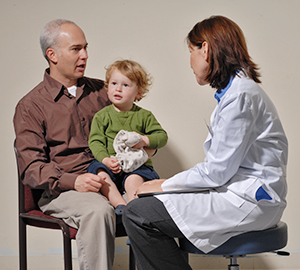Most babies and young children love to be held and cuddled. This helps them form close bonds with their parents and other caregivers. But children with autism may resist being touched. And they may often seem remote and withdrawn. Some may never learn to talk. There is no cure for autism. But many children with the disorder can be greatly helped with intensive treatment. This works best if they are given it early.
What is autism?
Autism spectrum disorder (ASD) is a range of disorders in which a child's brain doesn't develop normally. Autism or autistic disorder is the most severe form of ASD. Symptoms often appear before age 3 and stay throughout the child’s lifetime. These symptoms can vary widely. They may be mild or severe. Most people with autism have trouble talking and relating to others. They often seem to be in a world of their own. Some children with the disorder may not respond to smiles or eye contact. They may repeat certain actions over and over. They may follow rigid routines. Or they may be obsessed with parts of objects. A few may even try to harm themselves or others.
Signs of autism
Each person with autism is unique. Some children with autism may:
-
Be slow in learning to talk or not learn to talk at all
-
Want to be alone rather than with others
-
Not share and play the way other children do
-
Be sensitive to sounds, touch, smells, or tastes
-
Throw tantrums or try to harm themselves or others
Who does it affect?
Boys are 4 times more likely to have autism than girls. Autism is in all ethnic, economic, and social groups. Any child can have this disorder.
What causes it?
Parents of children with autism often blame themselves. But autism is no one's fault. Some genes may affect the way your child's brain develops. Other factors may play a role. These include viruses or chemicals.
What can help?
Early assessment and help is crucial for children with autism. This is because children learn best when they're very young. The American Academy of Pediatrics advises a formal autism screening for all children at the 18- and 24-month well child visits. This is in addition to regular developmental checks. This helps find children with behavioral and developmental challenges as early as possible. With early help, special therapists can help your child learn social and language skills. School programs can be tailored to your child's needs. As your child gets older, many caring professionals can help. Talking to your healthcare provider is a good place to start.
Featured in


